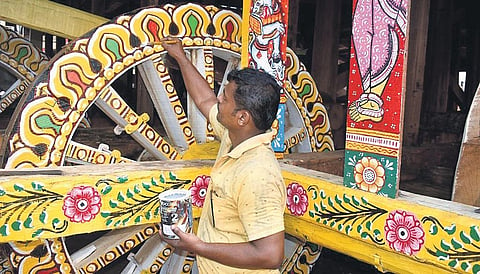

BHUBANESWAR: On Thursday, millions had a lump in their throat when news broke that Rath Yatra in Puri has been stayed by the Supreme Court. The emotion was universal, just like the unwavering love and reverence Lord of the Universe evokes.
In the living memory, this may be for the first time the splendorous Rath Yatra would not take off on that grand expanse connecting the Holy Trinity’s abode and their aunt’s place in the pilgrim town. Historians would tell you that such an occasion has presented itself after 284 years.
It’s but natural that the Supreme Court’s momentous order has taken time to sink in. The apex court’s order comes at a very critical juncture of India’s coronavirus battle and as Odisha passes through a crucial phase having successfully tackled the health crisis so far. However, a sense of loss haunts the vast majority of followers. That’s primarily because there was a glimmer of hope that Odisha Government would pull it off.
As clouds of uncertainty prevailed over the annual festival of Jagannath Temple after the virus outbreak, the Government made the right noises and the Sri Jagannath Temple Administration put in place preparations even during lockdown to ensure that all critical rituals are conducted with social distancing and by keeping the devotees away.
The construction of chariots was carried out by isolating the ‘maharanas’ who sweated it out day and night to make up for the loss of time while servitors – key to nitees of the deities as well as the festival – were put to COVID-19 test and quarantined whenever needed.
The fact that the Government did not permit incoming trains to Puri and restricted hotel bookings sent out signals of its intent. That is exactly why it has baffled many that Odisha’s systematic preparation for a crowd-less Rath Yatra was not presented before the apex court during the hearing on Thursday.
Chairman of Managing Committee of the Jagannath Temple and Puri Gajapati Dibyasingh Deb echoed the sentiments today saying: "It seems, the State Government did not take notice of the May 30 resolution of the temple managing committee on Rath Yatra."
The apex panel of the temple administration had sent in a 22-page resolution to the Government outlining details of plans to conduct the car festival without any congregation and maximum social distancing. The matter had gone to the Orissa High Court which left the onus on the State Government. Then it came up before the SC basing on a petition filed by Odisha Vikash Parishad.
The apex court’s order is clear and has been welcomed by Puri Shankaracharya Swami Neeschalananda Saraswati as well as the Gajapati King. However, both underline that Rath Yatra being central to the Puri temple – "moola peetha" of Lord Jagannath - continuity must be maintained.
Lord Jagannath embodies more than faith; He is inseparable from the collective conscience of Odias. As more petitions are filed before the SC seeking a review of its order, Odisha is looking at a critical phase of its modern history.
Gajapati asks Odisha government to file review petition in SC
In a late night development, Puri Gajapati Dibyasingha Deb requested Odisha Government to file a review petition in the apex court seeking permission to organise Rath Yatra in Srikhetra, the original abode of Lord Jagannath amid tight security with minimum number of servitors and without participation of devotees.
Initially conceding to the State Cabinet’s decision to honour the SC order, the Puri King changed his stance after being informed that Rath Yatra is being organised at Ahmedabad in Gujarat, one of the five COVID-19 hotbeds of the country.